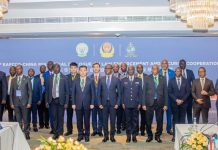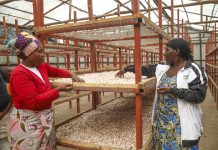Africa-Press – Rwanda. The Eastern Africa sub-region needs to work harder and smarter to recover faster and build back better from the devastating impact of the Covid-19 pandemic.
This is according to Uzziel Ndagijimana, Rwanda’s Minister of Finance and Economic Planning, who was addressing delegates at the 25th Meeting of the Intergovernmental Committee of Senior Officials and Experts (ICSOE) on Wednesday
“Despite the devastating impact of Covid-19 on the health of our population and economies, we still have great potential for growth in Africa in general and in our region in particular,” he said.
The meeting currently underway in Kigali is discussing the road to social and economic recovery.
“It is our role during this meeting to exchange views on how this can be achieved even in a very difficult context,” Ndagijimana said.
In Addition to the economy, experts will also discuss peace and security as the key enabler for growth and development.
Before the pandemic, Eastern Africa was the fastest-growing region on the continent.
“The Covid-19 pandemic has affected most of our economic activities and pushed our economies into recession,” the minister said.
Vera Songwe, the Executive Secretary of the Economic Commission for Africa (ECA), recalled that last year, delegates discussed the impacts of the social and economic crisis in the region.
In 2020, she noted, the economy in Eastern Africa shrunk for the first time in decades.
“The services and manufacturing sectors were hit hard by the pandemic, particularly revenues in tourism and travel-related industries,” she added, “The agricultural sector was not spared, facing weather-related shocks and the biggest desert locust invasion in 70 years.”
As a result of the pandemic, millions of jobs have been lost.
“Emerging conflict in the Horn of Africa added to the already heightened regional insecurity,” Songwe stressed.
However, she remains optimistic about a region whose health sector has been strained by the pandemic.
“Furthermore, we were looking forward to the Jan 1st launch of trading in the AfCFTA,” she stated.
So far in 2021, Songwe said, while the situation is largely the same, “we were correct in our optimism.”
According to Songwe, early projections suggest that the sub-region’s economy will expand by 3 per cent this year, with countries like Djibouti, Eritrea, Rwanda and Uganda rebounding by over 4 per cent.
But caveats abound, she said, adding that recovery in tourism, travel, and other service industries has been slow.
“Prices for food, housing, transport, and utilities seem to have increased generally, pressuring all citizens but especially poorer households. Fiscal pressures in Eastern Africa mounted as the tax base eroded and spending on social protection measures increased.”
“Unsurprisingly, this year has also been a tough one for trade. But since our meeting last year, four additional member States ratified, or are very close to ratifying, the AfCFTA Agreement. Congratulations to Burundi, DRC, Seychelles and Tanzania on your progress so far. Our office stands ready to support you in developing national strategies to maximise your gains from the agreement, just as we have for several countries already in the sub-region and beyond.”
On the pandemic front, despite the upsurge in Covid-19 in the region, Songwe said, most countries still have confirmed infection and death rates well below the continental average.
She said vaccine rollout has been modest, inhibited by vaccine access, hesitancy, administration, and challenges with supply chains and procurement of essential supplies.
“This year, although we again reflect on the pandemic’s impact, we also look forward to what recovery looks like for Eastern Africa and will align on what it takes to get us there. The efforts to enhance regional trade, manufacturing capacity, and health systems will go a long way to building the region’s resilience to future shocks,” Songwe said.
“Another strategy is continuing to improve the investment climate in Eastern Africa. The variety of investment opportunities already creates strong appeal for investors within and beyond the continent.”
Songwe also noted that implementing the AfCFTA can further increase intra-regional investment, “which our background study notes” is less focused on extraction and can better support economic industrialisation, diversification, and development.
For More News And Analysis About Rwanda Follow Africa-Press






